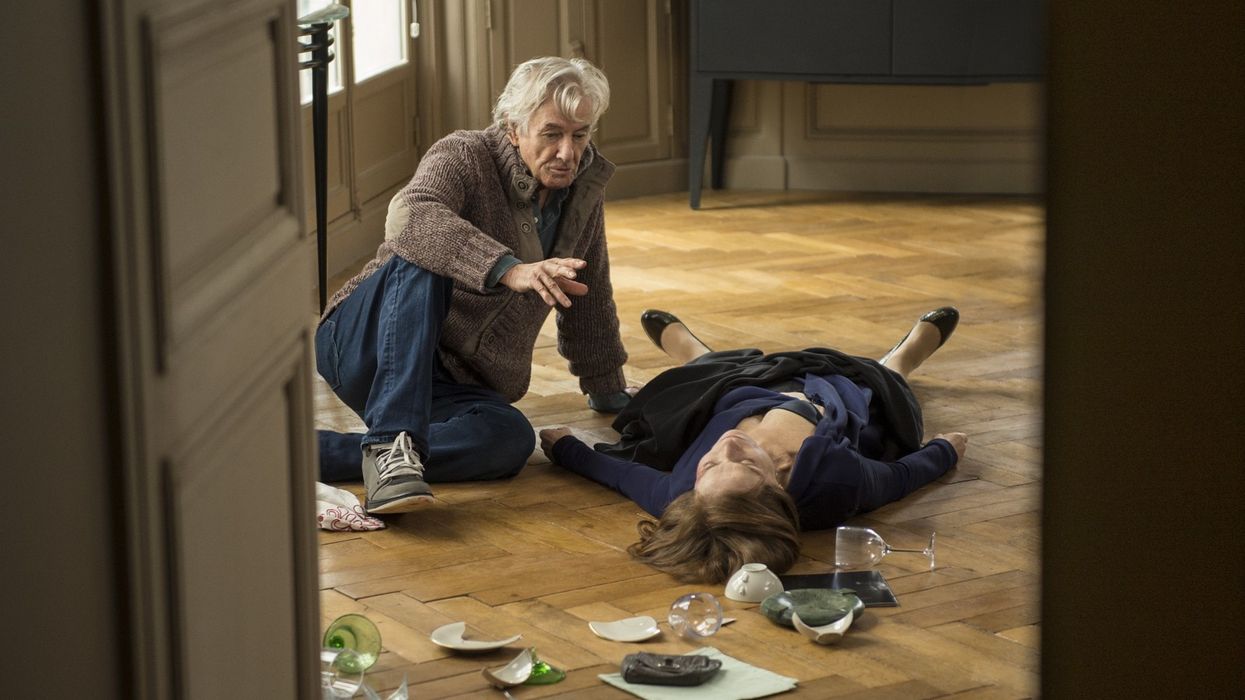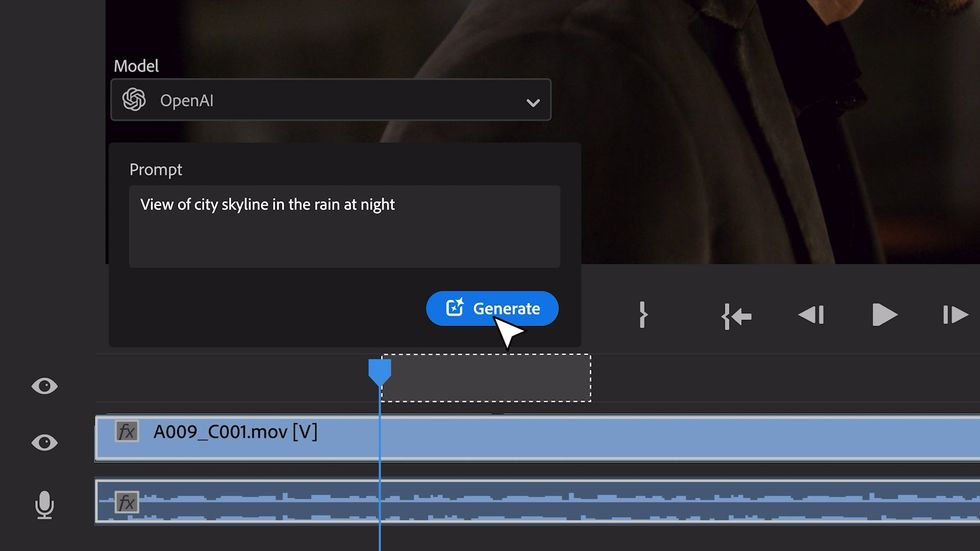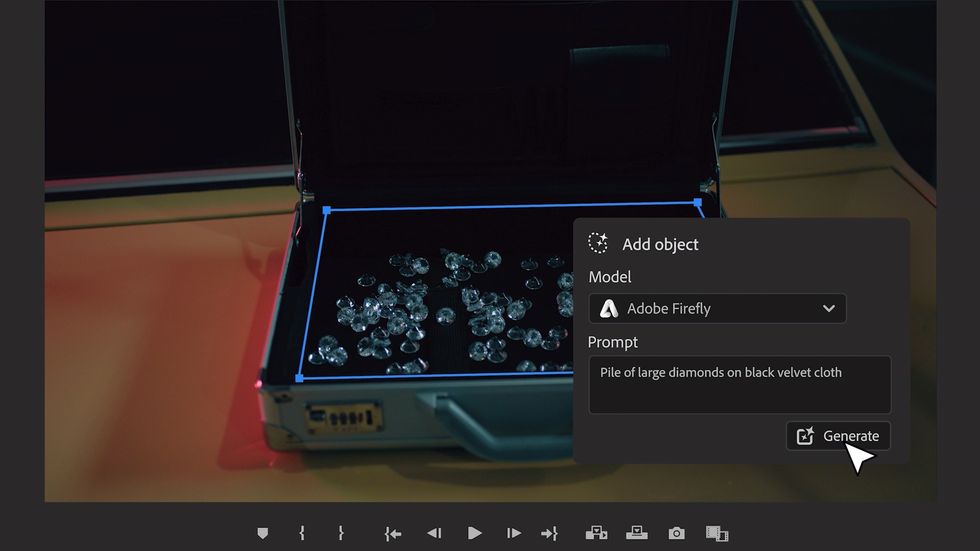'Elle': Paul Verhoeven on Why You Have to Embrace and Fear Your Films at the Same Time
The Total Recall and Basic Instinct director's latest cinematic adventure, Elle, brings dignity to dramedy.

Dutch director Paul Verhoeven is 78-years old, but has the aura of a teenager. His hybrid attitude towards film–and life–is suggested by the Air Jordan sneakers that belie his vintage. Even he considers himself a hybrid: “I’m Dutch, but I’m supposed to be American, but right now I’m French,” he says. In keeping with his youthful spirit, Verhoeven is always looking for his next cinematic adventure, and his new hybrid film Elle is exactly that.
This past week, Elle had its US premiere at the New York Film Festival, following its world premiere at Cannes in May. Critical acclaim came swiftly after Cannes, and the film was soon chosen as the French entry for the “Best Foreign Language Film” category in the upcoming 89th Academy Awards. The last Cannes saw of Verhoeven was in 1992, with his film Basic Instinct. In fact, even though he is considered a prolific filmmaker, Elle is his first feature in ten years (since The Black Book, 2006) and his very first French language film.
Elle is worth the wait. A haunting ‘dramedic’ adaptation of French author Philippe Djian’s novel, Oh…, the film centers on a cat-and-mouse game between French lead actress Isabelle Huppert’s successful businesswoman and her rapist. From a superficial standpoint, everything about Elle defines it as a thriller, and a very suspenseful one at that. What comes as a pleasant surprise–especially in contrast with the many hyper-serious films that have received recognition at recent festivals–is the driving comedic heart beneath a surface of violence and intrigue. No Film School sat down with Verhoeven at both Cannes & NYFF, tracking the progress of his mesmerizing new film. Here are some of our top takeaways about his filmmaking approach and his thoughts about working in America versus Europe.
Laugh in the face of misfortune
This film is intense. It opens with a scene of sexual violence. For that reason, perhaps, it was programmed near the very end of both Cannes and NYFF. Members of the audience gasped, then held their breath. Some shrieked. Others shifted in their seats, audibly apprehensive–even weary–to see yet another rape scene unfold. There’s no excuse for rape; but even so, on-screen sexual assaults have become increasingly common–a trend Jodie Foster pegged in an early Cannes interview as the “go-to motivation” created by script-challenged males as their solution for ‘underwritten’ female characters.

Huppert’s character is surprisingly strong, and so is the film’s sense of humor. Elle is rife with laughs, and the film’s darker moments are made digestible by on-the-nose, hilarious dialogue. Like the novel on which it was based, the film possesses a sharp sense of irony, a tongue-in-cheek attitude towards its violence and interpersonal ruptures. In lesser hands, this delicate balance might not have been possible. Isabelle Huppert’s performance delivers a remarkable range of emotion, and Verhoeven’s tonal shifts are clearly the work of a master.
“The movie itself is the language, all our talk about it afterwards is another kind of entertainment.”
Filmmaking should be a mystery
Verhoeven is known for producing powerful, perverse films: either full of women in danger, or dangerous women. Elle is no exception–but it adds a new layer. This film transcends genre, because of its strong and complex female lead. Huppert explained her interest in the role at a NYFF press conference: “She's a new type of woman. That excited me. A post-feminist character, building her own behavior and space somewhere between victim and avenger. She's the result of man’s failure, and in turn, all the male figures in Elle are failed and weak.”
While Verhoeven obviously agrees with Huppert’s take on the character, he doesn't see his latest work as a post-feminist or even as a feminist film. After the NYFF premiere, he elaborated “The movie itself is the language, all our talk about it afterwards is another kind of entertainment.” As he sees it, Elle can’t be ‘accused’ of promoting feminist content because he creates all of his films without predispositions.

“In the mystery of creating art,’ he explained, “you start somewhere but don't know where you'll end. Your intuition and artistry lead you to do certain things, and it’s important that you don't know exactly what to do going in. Artists need to have some adventure, something to discover. Without adventure, creation is perverted, which is why I never did any sequels. If you’ve already done something once, the adventure is gone, so what's the challenge? A film has to be something you embrace and fear at the same time.”
Verhoeven cited one of his earlier films as proof of this philosophy: “When we were working on Starship Troopers (1997), we were continuously laughing about our ideas as they evolved in front of us in new, lighthearted ways.” To Verhoeven, that was a quintessential creative achievement—and that was his intention with Elle.
Some scripts are worth a second look
Elle is a far cry from Verhoeven’s earlier films, of the made-in-America period when he was known primarily as a pioneer of science fiction.
Originally from the Netherlands, he traveled to Hollywood in the 1980s in order to find new opportunities, and one of the first scripts he was offered was Robocop. The first time he read it, he thought it was horrible and threw it away. He laughed, remembering. “My wife told me I was making a mistake and got me to re-read it. I finally took the script because of the Biblical implications, especially the scene where he returns to his house and gets flashes of his past life. For me, that was resurrection and paradise lost. I ended up adding aspects of myself and my interest in Jesus to the film. Then I came to the States and stayed. It was all very lucky,” he recalled.

Over the course of a decade, Verhoeven developed his ‘signature style’ of dark, violent sci-fi thrillers. Robocop came first in 1987; then came Total Recall (1990), Starship Troopers (1997), and Hollow Man (2000). They all were huge hits commercially as well as receiving numerous awards and nominations for visual effects.
“Maybe this kind of ritualistic cult popularity isn’t what I intended, but it was like a resurrection after the crucifixion.”
Face your failures with humor
Not all of Verhoeven’s films have been well-received, however, and not all of his time in Hollywood was positive. When his controversial exploration of Las Vegas Showgirls came out in 1995, it received numerous “Razzie Awards” in recognition of “worst-in film.” He knew just what to do: because he possesses the same subversive sense of humor found in his films, he showed up at the Golden Raspberry Awards ceremony to accept his prize for “Worst Director.”
Even better, he still laughs about it. “I still have it, sure,” he admitted, grinning. “It was a very liberating experience, to go there. Like the Jesus saying, 'If they slap you on the right cheek, turn to the left. ' I can assure you that Jesus was completely right.”
As he tells it today, the Razzie audience was yelling and screaming in reaction to his movie, oblivious to the fact that he was sitting there with them. Then, he surprised everyone: he was the first director ever to show up for a Razzie award. More specifically, seven.

“There were seven awards. I had to walk up there seven times. But they had only one Razzie statue, so I had to give it back again and again for each award. But what happened is, because I was there and came forward, it was like leaving everything behind me and saying ‘OK it’s done. The circle is full.’ At the end it was a wonderful evening. Everybody was happy with me too for being a good sport.”
Showgirls later earned a spot as a notorious cult-hit. Continuing his Jesus metaphors, Verhoeven described his feelings afterwards, “Maybe this kind of ritualistic cult popularity isn’t what I intended, but it was like a resurrection after the crucifixion.”
By 2006, however, he was done with America. He returned to filmmaking in Holland and has since maintained a semi-permanent exile.
“The movies I made back in the ‘80s and ‘90s are no longer possible in Hollywood.”
Can any film be made in America?
Here’s the irony: originally, Elle was supposed to be an American production, and would have been Verhoeven’s return to American cinema. The film’s inception came about when producer Saïd Ben Saïd sent him Djian’s novel and asked whether he would like to make a film based on the book.
“I felt it was a minor miracle to find something so new that I’d never done before,” Verhoeven recalled fondly. “But nobody in the States was interested in this project–financially or artistically. I think the fact that the main character identifies with her rapist was probably the reason they didn't want to do it. In an American movie it would have been about revenge.” He shrugged. “But this novel, the script, the film, they all go in the opposite direction thematically. So we had to go back to Paris. I knew from the beginning that Isabelle was interested in the role. And I was lucky. In retrospect, I couldn't see this as an American movie.”
The current dark mood in Hollywood lacks the light touch that makes Elle so effective. “The movies I made back in the ‘80s and ‘90s are no longer possible in Hollywood,“ Verhoeven sighed, referring to films like Starship Troopers, Robocop and Total Recall. Both Robocop and Total Recall were remade in the past four years, and he felt that any element of irony—"a light touch or a wink"—was removed from the new versions. Verhoeven said, "They’re straight on. And I think both stories are a little bit ridiculous. So if you take them completely seriously, I think its really horrible! Something seems to be lost a little bit in Los Angeles.”

For Verhoeven, Elle offered something unexpected. “This story is something different, this kind of comedy/thriller is new for me.” Some critics have compared Elle to his erotic thriller Basic Instinct (1992), or to his Dutch love story Turkish Delight (1974), an Academy Award nominee for Best Foreign Language Film, but he disagrees. “The closest parallel I can find is Les Règles du Jeu–a 1939 social satire directed by Jean Renoir–because it contains elements of tragedy, comedy and also tension. Like Elle, that film was a surprise. And I need that. I miss that.”
As it turns out, making Elle in France instead of in the US was the right choice for Verhoeven, and for the film. “This was my first French movie–in terms of both actors, language and location,” he explained. “And it made a big difference in tone. You have to come to a country. Otherwise you will never feel what the soul of the country is. With Robocop, I surrounded myself with Americans. With Elle, I dove into French culture.”

"They’re similar characters, perhaps, Jean Moulin and Jesus," said Verhoeven. "Right now I’m interested in resistance." In fact, it seems that resistance is his stock in trade. "I don’t make movies for money; that’s boring. I do my best work on projects that interest me. Money comes anyhow when you do it that way."
In Verhoeven’s world, only one thing is certain: he will continue resisting the status quo. He will continue making interesting hybrids like Elle. And, if we’re lucky, maybe a great script will bring him back to Hollywood.














